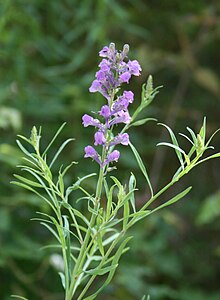Linaria purpurea: Difference between revisions
Stemonitis (talk | contribs) Remove gallery per WP:IG |
add references |
||
| Line 12: | Line 12: | ||
|binomial_authority = ([[Carl Linnaeus|L.]]) [[Philip Miller|Mill.]] |
|binomial_authority = ([[Carl Linnaeus|L.]]) [[Philip Miller|Mill.]] |
||
}} |
}} |
||
'''''Linaria purpurea''''' is a species of flowering plant in the [[Plantaginaceae|plantain family]] known by the common name '''purple toadflax'''. It is native to [[Italy]],<ref>[http://www.ars-grin.gov/cgi-bin/npgs/html/taxon.pl?404687 GRIN Species Profile]</ref> but it can be found growing wild as an [[introduced species]] in parts of western North America, including [[California]],<ref>[http://ucjeps.berkeley.edu/cgi-bin/get_JM_treatment.pl?7177,7370,7376 Jepson Manual Treatment]</ref> western [[Washington (U.S. state)|Washington]],<ref>[http://biology.burke.washington.edu/herbarium/imagecollection.php?Genus=Linaria&Species=purpurea Burke Museum]</ref> and [[British Columbia]],<ref |
'''''Linaria purpurea''''' is a species of flowering plant in the [[Plantaginaceae|plantain family]] known by the common name '''purple toadflax'''.<ref name=BSBI07>{{cite web |title=BSBI List 2007 |publisher=Botanical Society of Britain and Ireland |url=http://www.bsbi.org.uk/BSBIList2007.xls |format=xls |archive-url=http://www.webcitation.org/6VqJ46atN |archive-date=2015-02-25 |accessdate=2014-10-17}}</ref><ref name=PLANTS>{{PLANTS|id=LIPU3|taxon=Linaria purpurea|accessdate=26 January 2016}}</ref> It is native to [[Italy]],<ref>[http://www.ars-grin.gov/cgi-bin/npgs/html/taxon.pl?404687 GRIN Species Profile]</ref> but it can be found growing wild as an [[introduced species]] in parts of western North America, including [[California]],<ref>[http://ucjeps.berkeley.edu/cgi-bin/get_JM_treatment.pl?7177,7370,7376 Jepson Manual Treatment]</ref> western [[Washington (U.S. state)|Washington]],<ref>[http://biology.burke.washington.edu/herbarium/imagecollection.php?Genus=Linaria&Species=purpurea Burke Museum]</ref> and [[British Columbia]],<ref name=PLANTS/> and it is cultivated as an [[ornamental plant]].<ref>[http://www.mobot.org/gardeninghelp/plantfinder/Plant.asp?code=A242 Kemper Garden Center]</ref> It is a perennial herb growing 30 to 70 centimeters tall with linear leaves 2 to 5 centimeters in length. The [[inflorescence]] is a [[raceme]] of flowers occupying the top of the stem. The flower is between 1 and 2 centimeters long with five lobes arranged into two lips with a spur at the end. The flower is usually light to medium purple in color. |
||
==References== |
==References== |
||
Revision as of 06:42, 26 January 2016
| Linaria purpurea | |
|---|---|

| |
| Scientific classification | |
| Kingdom: | |
| (unranked): | |
| (unranked): | |
| (unranked): | |
| Order: | |
| Family: | |
| Genus: | |
| Species: | L. purpurea
|
| Binomial name | |
| Linaria purpurea | |
Linaria purpurea is a species of flowering plant in the plantain family known by the common name purple toadflax.[1][2] It is native to Italy,[3] but it can be found growing wild as an introduced species in parts of western North America, including California,[4] western Washington,[5] and British Columbia,[2] and it is cultivated as an ornamental plant.[6] It is a perennial herb growing 30 to 70 centimeters tall with linear leaves 2 to 5 centimeters in length. The inflorescence is a raceme of flowers occupying the top of the stem. The flower is between 1 and 2 centimeters long with five lobes arranged into two lips with a spur at the end. The flower is usually light to medium purple in color.
References
- ^ "BSBI List 2007". Botanical Society of Britain and Ireland. Archived from the original (xls) on 2015-02-25. Retrieved 2014-10-17.
- ^ a b NRCS. "Linaria purpurea". PLANTS Database. United States Department of Agriculture (USDA). Retrieved 26 January 2016.
- ^ GRIN Species Profile
- ^ Jepson Manual Treatment
- ^ Burke Museum
- ^ Kemper Garden Center
External links
![]() Media related to Linaria purpurea at Wikimedia Commons
Media related to Linaria purpurea at Wikimedia Commons
